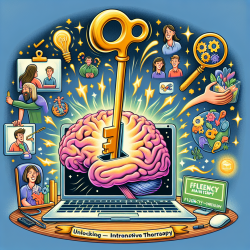Introduction
In the complex landscape of psychiatric residential treatment (RT) for adolescents, maintaining treatment gains post-discharge remains a significant challenge. A recent study, "Web-Based Parent Training in Parents with Adolescents Admitted to Psychiatric Residential Treatment: A Mixed-Methods Study," explores a promising solution: web-based parent training. This study offers insights into how practitioners can leverage technology to enhance parental involvement and improve outcomes for adolescents.
Understanding the Study
The study employed a mixed-methods design to evaluate the acceptability, appropriateness, and feasibility of a web-based parent training program called Parenting Wisely (PW) among parents of adolescents in RT. With a sample size of 20 parents, the study found that most participants completed at least 80% of the modules, indicating high engagement. Parents reported that the web-based format was easy to use and facilitated learning, allowing them to practice skills like effective communication and active listening in their daily lives.
Key Findings
- Increased Accessibility: The web-based delivery of PW circumvented barriers associated with in-person interventions, such as scheduling and transportation issues.
- Skill Application: Parents practiced skills like logical consequences and effective communication, which they found beneficial in managing adolescent behavior.
- Relatability and Content: While a large subset of parents found the scenarios relatable, a small subset felt the modules did not fully capture the severity of their adolescent’s mental health challenges.
Implications for Practitioners
For practitioners, the study underscores the potential of web-based parent training as an adjunct to traditional RT programs. By integrating such programs, practitioners can offer parents flexible, accessible tools to support their adolescents' transition from RT to home. Tailoring the content to address the specific challenges faced by families in RT can further enhance the program's effectiveness.
Encouraging Further Research
While the study provides a solid foundation, further research is needed to explore the long-term impact of web-based parent training on treatment gains and family dynamics. Practitioners are encouraged to contribute to this growing field by conducting studies that examine diverse populations and settings.
Conclusion
Web-based parent training offers a viable, effective means of supporting parents and adolescents in RT settings. By addressing barriers to access and engagement, these programs can play a crucial role in maintaining treatment gains and fostering positive outcomes. Practitioners are invited to explore and implement these findings to enhance their practice and improve the lives of the families they serve.
To read the original research paper, please follow this link: Web-Based Parent Training in Parents with Adolescents Admitted to Psychiatric Residential Treatment: A Mixed-Methods Study.










